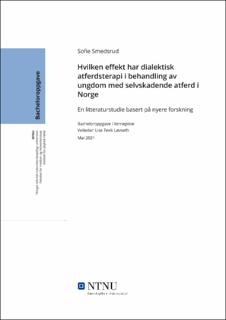| dc.contributor.advisor | Løvseth, Lise Tevik | |
| dc.contributor.author | Smedsrud, Sofie | |
| dc.date.accessioned | 2021-09-25T16:45:49Z | |
| dc.date.available | 2021-09-25T16:45:49Z | |
| dc.date.issued | 2021 | |
| dc.identifier | no.ntnu:inspera:81471222:34431995 | |
| dc.identifier.uri | https://hdl.handle.net/11250/2783478 | |
| dc.description.abstract | Tittel: Hvilken effekt har dialektisk atferdsterapi i behandling av ungdom med selvskadende atferd i Norge.
Introduksjon/bakgrunn: Stor økning av selvskadende atferd blant ungdom i Norge, øker behovet for utviklingen av effektive behandlingstilbud for denne målgruppen. Dialektisk atferdsterapi for ungdom (DBT-A) har som behandlingsmål å redusere forekomst av selvskading og selvmord, samt redusere frafall fra behandling. Vernepleiere har et helhetlig perspektiv på utfordrende atferd slik som selvskading, ved å fokusere på meningen og mennesket bak handlingen. Det er essensielt at vernepleiere som skal utøve DBT-A behandling eller jobbe på institusjoner hvor ungdommen som mottar behandlingen bor har kunnskap rundt effekten av behandlingstilbudet som gis.
Hensikt: Oppgaven har som hensikt å forbedre livskvalitet og redde liv ved å øke kunnskap og forståelse hos helsepersonell rundt ungdom med selvskadende atferd og effekten de mottar av DBT-A behandling. Problemstillingen skal undersøke effekten dialektisk atferdsterapi har som behandlingsform både selvstendig og sammenlignet med andre behandlingsformer for ungdom med selvskadende atferd i Norge.
Metode: Litteraturstudien tar for seg fem fagfellevurderte forskningsartikler samt annen relevant litteratur om tema. Tre av de fem forskningsartiklene inkludert er randomisert kontrollerte undersøkelser, og sammenligner DBT-A behandlingen med et annet behandlingstilbud.
Resultat: Alle fem forskningsartiklene viser til reduksjon i ikke-suicidal selvskadende atferd, selvmordstanker og selvmordsforsøk etter gjennomgått DBT-A behandling. I tillegg til dette viste noen artikler at ungdommene som mottok DBT-A behandlingen hadde økt deltakelse og fullførhetsgrad av behandlingen.
Konklusjon: Analysen av fagartiklene har synliggjort at DBT-A har en betydningsfull og dokumentert effekt når det kommer til reduksjon av ikke-suicidal selvskadende atferd, selvmordstanker og selvmordsforsøk. Med en viss sikkerhet har DBT-A i tillegg vist en økt deltakelse og fullførhetsgrad av behandling, samtidig som egne erfaringer fra praksis tydeliggjør viktigheten av en vernepleierfaglig tilnærming. Selv om utvalget har vært lite og i forskjellige land, er det rimelig å anta at DBT-A vil ha en god effekt som behandling av ungdom med selvskadende atferd i Norge.
Nøkkelord: Dialektisk atferdsterapi, ungdom, selvskadende atferd, effekt.
Antall ord: 7642 | |
| dc.description.abstract | Title: What effect does dialectical behavior therapy have on the treatment of adolescents with self-harming behavior in Norway.
Introduction/background: A large increase in self-harming behavior among adolescents in Norway increases the need for development of effective treatment options. Dialectical behavior therapy for adolescents (DBT-A) aims to reduce self-harm behavior, suicidal ideation and suicide attempts, as well as reduce treatment drop-out rates. Social educators have a holistic perspective on challenging behaviors such as self-harm by focusing on the meaning and person behind the action. It is essential that social educators who give DBT-A treatment or work at institutions where adolescents who receive the treatment live, have knowledge of the effects the treatment offers.
Purpose: The purpose is to improve quality of life and save lives by increasing the knowledge and understanding health professionals has around adolescents with self-harming behavior and the effect they receive from DBT-A treatment. The thesis aims to investigate the effect of DBT-A treatment both alone and in relation to other treatment options for adolescents with self-harming behavior in Norway.
Method: This thesis uses literature study as a method and deals with five different peer-reviewed research articles as well as other relevant literature. Three of the five research articles included are randomized controlled trials and will compare DBT-A treatment with another treatment option.
Results: All five research articles refer to reduction in non-suicidal self-harm, suicidal ideation and suicide attempts. In addition to this, some articles showed that the adolescents receiving DBT-A treatment had increased participation and a higher degree of completion of treatment.
Conclusion: The analysis has shown that DBT-A has a significant and documented effect when it comes to reducing non-suicidal self-harm, suicidal ideation and suicide attempts. With some certainty DBT-A has also shown an increased participation and degree of completion of treatment, and own experiences clarify the importance of a social educator approach. Although the samples were small and from different countries, it is reasonable to assume that DBT-A will have a good effect as a treatment for adolescents with self-harming behavior in Norway.
Keywords: Dialectical behavior therapy, adolescents, self-harming behavior, effect.
Number of words: 7642 | |
| dc.language | nob | |
| dc.publisher | NTNU | |
| dc.title | Hvilken effekt har dialektisk atferdsterapi i behandling av ungdom med selvskadende atferd i Norge | |
| dc.type | Bachelor thesis | |
